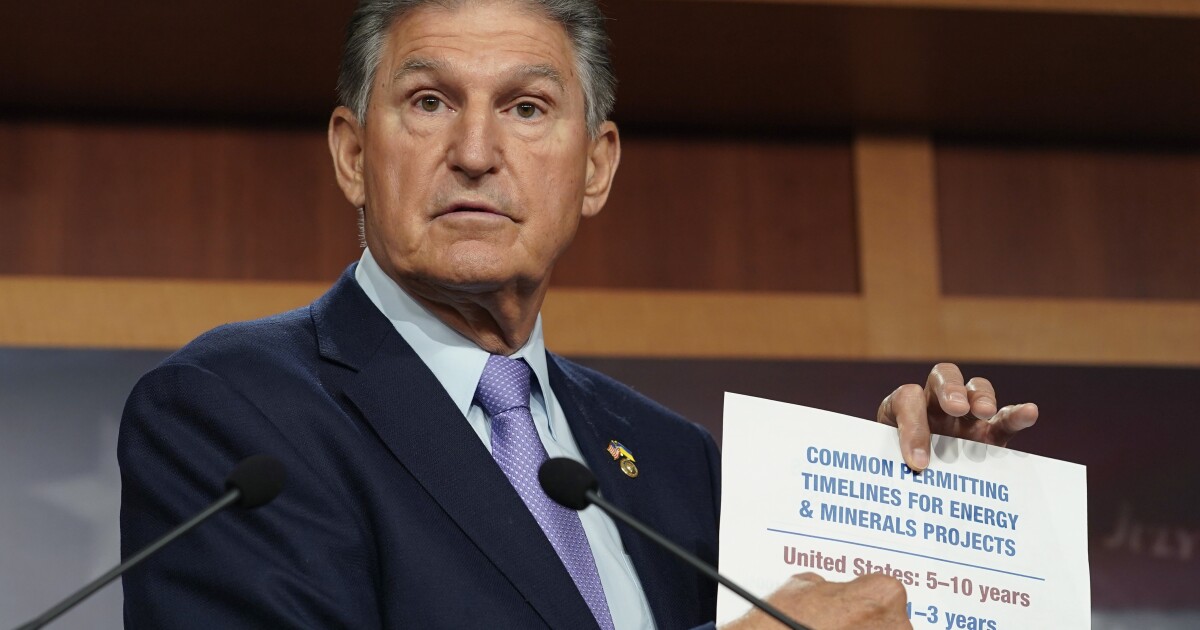

The Treasury Department recently published new information detailing how it will implement revamped clean vehicle tax credits and dissatisfied one of the minds behind the subsidies in Senate Energy and Natural Resources Chairman Joe Manchin (D-WV), who demanded Treasury delay rollout of the credits.
Treasury pushed to March the anticipated publication of official tax guidance, which is expected to cut many vehicles manufactured overseas off from eligibility and begin advantaging models made closer home with a larger tax credit. The delay comes after months of lobbying against the credits by trade partners and is making for another battle between Manchin and the Biden administration.
SOME OF THE BIGGEST ENERGY STORIES TO START THE YEAR
Here’s the latest:
What are the tax credits?
The tax credits and their strict manufacturing qualifications were an outgrowth of Manchin’s monthslong legislative negotiations that culminated in the Inflation Reduction Act. They were designed to facilitate more domestic production of electric vehicles and their components, both to support U.S. industry and weaken China’s grip on the global EV sector.
The Inflation Reduction Act amended federal law to provide maximum $7,500 tax credits for new, light-duty “clean vehicles” to boost the number of electric vehicles on the road. Fuel cell vehicles are eligible under the credit.
There are two separate credits: one for qualifying vehicles purchased for consumer use and one for commercial use.
The law also provides a credit of up to $4,000 for qualifying purchases of used clean vehicles.
Why do trade partners have a problem?
The law placed strict eligibility requirements for vehicles to be eligible for the full consumer clean vehicle credit: the vehicle must be assembled in North America, and its battery must comply with a progressive component sourcing schedule.
The sourcing requirements provide that qualifying vehicles must contain an increasing percentage of battery components and critical minerals from specific countries, including but wholly not limited to the United States.
The full subsidy will not be extended to vehicles assembled outside North America nor to vehicles that fail to source key battery and mineral components according to the credit’s restrictions, angering trade partners in Europe and elsewhere who see the move as tipping the scales against their national manufacturers.
What did Treasury put out?
The department put out several documents on Thursday, including one laying out the “anticipated direction” of guidance planned for March that will formalize the new clean vehicle tax credit’s critical mineral and battery component requirements for consumer purchases.
Until then, those requirements will not be applicable, Treasury said.
The North American final assembly requirement for the consumer credit is currently effective, however, it said. The department released an updated list of qualified vehicles as of Jan. 1, 2023.
Other notable details in a separate Treasury fact sheet about the credits suggest the department is interpreting the commercial clean vehicle credit to apply to a broad range of business activities. A taxpayer must use the vehicle for business use to receive the commercial clean vehicle credit under the law, and Treasury said business use generally “means any use in a trade or business of the taxpayer.”
The Inflation Reduction Act did not put the same assembly and sourcing restrictions on the qualified commercial clean vehicle credit as it did the consumer credit. However, both are reserved for light-duty vehicles, providing a potential loophole for foreign vehicle manufacturers, which could target the commercial market to access that credit rather than move operations to comply with the consumer credit’s restrictions.
Manchin has urged Treasury to interpret the law more narrowly and to exclude rideshares, rentals, and leased vehicles from the eligibility for the commercial credit.
What is Manchin’s problem?
Manchin accused the Treasury Department of ignoring Congress in withholding proposed guidance finalizing the consumer vehicle credit’s sourcing requirements.
CLICK HERE TO READ MORE FROM THE WASHINGTON EXAMINER
“The Treasury Department has known since August that they needed to release proposed guidance on the battery material and components of the Clean Vehicle Credit that accurately follows the intent of the IRA by the end of this year,” he said, calling on the department to delay implementation of both the consumer and commercial clean vehicle credits.
He also said the department’s information on how it’s planning to implement the credits “bends to the desires of the companies looking for loopholes and is clearly inconsistent with the intent of the law,” and pledged to introduce legislation that “clarifies the original intent of the law and prevents this dangerous interpretation from Treasury from moving forward.”







